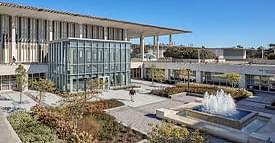Master of Science [M.S] (Education - Childhood Education)
Field of Study:
₹15.2 L/Yr
Tuition Fees
| Year | 1st Year Fees |
|---|---|
| Tuition Fees | ₹1515982 (USD 17640) |
Important Dates
The program includes a range of relevant pedagogical methods for teaching and learning and strategies for devising, implementing and assessing learning experiences for all learners.
Career Outcomes
The program will prepare graduates to:
Demonstrate knowledge of the fundamental principles of childhood education.
- Understand the principles of sociological and psychological foundations of learning in childhood instruction.
- Demonstrate knowledge of the historical development and current trends in curriculum.
- Identify and use theories of Childhood Education.
- Identify theories and models for teaching students with exceptionalities, gifted and talented students, special needs, diverse learners, students who are bilingual and at-risk students
- Conduct research in childhood education.
- Use current technology to present content to children.
Demonstrate knowledge of a wide range of instructional practices, approaches, methods and materials to support instruction in the classroom.
- Demonstrate competencies for teaching and learning.
- Demonstrate knowledge of language acquisition and literacy development.
- Describe and utilize techniques for content area subject matter relevant to social studies, math and science, focusing on current trends and research methods.
- Design instructional methods, including computer-based practices, for learners at different stages of development and various cultural and linguistic backgrounds.
- Demonstrate the ability to utilize these instructional practices, approaches, methods and materials in the student teaching experience
Use a variety of assessment tools and practices to learn to teach effectively.
- Apply methods of assessment and evaluation.
- Use research methodologies in childhood education.
- Assess skills in human relations and partnering with parents and use the information for improvement.
- Identify ethical considerations as defined in the code of ethics of the education profession and how these apply to classroom instruction.
Interpret and apply standards of professional and state organizations.
- Demonstrate how to incorporate the goals of the US Department of Education standards into classroom instruction.
- Interpret and apply the principles of the Association of Childhood Education International, National Education Association and American Federation of Teachers.
- Demonstrate how to use findings and best practices of professional organizations to strengthen and update professional practice.
Demonstrate commitment to community issues.
- Participate in the Academic Service Learning course component.
- Identify local, national and global current events and their impact on the community
TOP Scholarships
| Scholarship name | Award amount | Eligibility |
|---|---|---|
| - | - | - |
| - | - | - |
| - | - | - |
Key Resources for Your Study Abroad Journey
Course Guides
Masters (MS) in USA: Colleges, Courses, Deadlines, Eligibility & Fees
Masters in Education in USA: Top Colleges, Admission, Fees, Scholarships, Jobs
Scholarship Grants & Financial Aids
| Name | Scholarship Per Student | Level of Study | Type | |
|---|---|---|---|---|
| Debesh Kamal Scholarship | Scholarship per student₹ 1.2 L/Yr$1,385 | Level Of StudyBachelor | TypeMerit-Based | |
| Young Professionals Program | Scholarship per studentVariable Amount | Level Of StudyDoctorate | TypeMerit-Based | |
| Innovation in Education Scholarship - La Tutors 123 | Scholarship per student₹ 42,970/Yr$500 | Level Of StudyBachelor | TypeMerit-Based | |
| Gyandhan Scholarship | Scholarship per student₹ 1.1 L/Yr$1,222 | Level Of StudyMaster | TypeMerit-Based |
Similar Colleges


University at Albany


Northern State University


Abilene Christian University
.jpeg?h=143&mode=stretch)

Ohio Northern University


University of South Carolina


University of Akron


State University of New York Polytechnic Institute


University of New Mexico
















.jpeg?h=40&w=40&mode=stretch)




.png?h=40&w=40&mode=stretch)










Comments